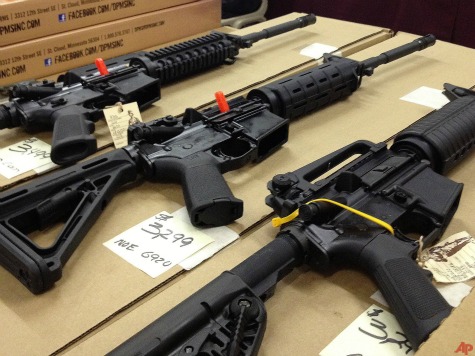
Gun rights return to the Supreme Court this year, challenging a federal regulation that resulted in a police officer’s felony conviction when he purchased a firearm for his uncle.
Bruce Abramski is a former police officer whose uncle wanted to buy a firearm. His uncle is a law-abiding person who can legally purchase, but since Abramski is a former policeman, there are gun shops where he can buy firearms at a discount. Thus, he decided to buy the gun for his uncle.
Everyone who purchases a firearm at a federally-licensed firearm retail store is familiar with Form 4473. The form is created by the Bureau of Alcohol, Tobacco, Firearms and Explosives (ATF) and, among other things, asks whether you are the actual purchaser of the firearm, versus purchasing for someone else. Form 4473 tells you that if you say you are not the actual buyer, you cannot purchase the gun.
Abramski and his uncle checked with several gun dealers, all of whom said the legal way to proceed was for Abramski to purchase in his home state of Virginia as the actual buyer, then go to his uncle’s home in Pennsylvania, where they could go to another federally-licensed firearm dealer to have his uncle fill out the same ATF paperwork and undergo the same background check, then have the firearm transferred to the uncle.
Abramski did so. Then he was charged and convicted of a federal felony for making a false statement that is “intended or likely to deceive” a gun dealer “with respect to any fact material to the lawfulness of the [gun] sale.”
Federal appeals courts with jurisdiction over many of the states in America understand that this provision of federal law is designed only to prevent “straw man” sales, where a buyer obtains the firearm on behalf of a convicted felon, domestic batterer, mentally ill person, or some other sort of person prohibited from buying guns. It is to make sure someone doesn’t get a gun on behalf of someone else who would be refused the sale after they failed a federal background check. In the Supreme Court’s words from 1976, it is to “keep firearms out of the hands of those not legally entitled to possess them because of age, criminal background, or incompetency.” It was not written to prevent a policeman from being a nephew who tried to save his law-abiding uncle some money.
Nonetheless, the U.S. Court of Appeals for the Fourth Circuit in Richmond (with jurisdiction over the Mid-Atlantic states) agreed with two other federal appeals courts in holding that when Abramski checked the box affirming he was the purchaser, he committed a serious federal crime.
If Abramski purchased the gun on his own, then decided to give it to his uncle as a free gift, that would be legal. Or if Abramski bought it for himself, then the following week decided to sell it to his uncle, that would be legal. But because his uncle wrote him a check for the gun before Abramski went to the store to buy the gun, and thus was acting as his uncle’s agent to buy a gun, Abramski became a federal felon.
Question 11a on Form 4473 is poorly worded. That wording was chosen by ATF, not Congress. If Question 11a instead asked if you are purchasing on behalf of someone who cannot legally purchase a firearm, then Abramski would honestly have said “no,” and there would not be any criminal conviction.
On Oct. 15, the Supreme Court granted review in Abramski v. U.S. Arguments are likely around February, with a decision before July 2014.
Ken Klukowski is senior legal analyst for Breitbart News. Follow him on Twitter @kenklukowski.

COMMENTS
Please let us know if you're having issues with commenting.